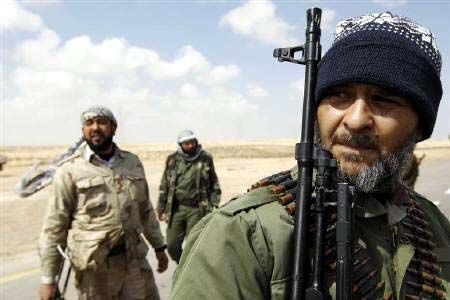Rebels Wary of African Union Talks
An African Union delegation arrived in the de facto capital of the Libyan opposition Monday hoping to convince wary rebel leaders to accept a proposed ceasefire.
But the delegation received a lukewarm welcome. Rebel leaders say they do not believe that Libyan leader Moammar Gaddafi would adhere to a ceasefire, and they reject any plan that does not include Gaddafi’s immediate resignation and departure from the country.
The rebels’ Transitional National Council--largely made up of doctors, lawyers, intellectuals, defectors and former exiles--is deeply skeptical about the neutrality of the African Union, which they see as packed with Gaddafi allies.
Opposition leaders are also likely to be disappointed because the peace plan fails to wring any concessions from Libya’s leader at the outset, despite the brutal suppression of protests in February in which hundreds of people were shot and thousands were arrested.
Gaddafi accepted the plan--dubbed a “political road map”--after meeting with the delegation in Tripoli on Sunday. The plan calls for an immediate cease-fire--including, officials said, the suspension of NATO bombings of Gaddafi’s military equipment and troops; cooperation from the authorities to guarantee safe passage for humanitarian aid; the protection of foreign nationals, including African migrant workers; and the launching of a dialogue about reform between the government and the opposition.
That dialogue would take place during a transition period, “with the view to adopting and implementing the political reforms necessary for the elimination of the causes of the current crisis, including democracy, political reform, justice, peace and security, as well as socio-economic development,” the A.U. said in a statement.
But many political experts say democracy is fundamentally incompatible with a totalitarian regime based around Gaddafi’s personality cult. Compromise between the rebels and the government would be extremely difficult, if not impossible, they say.
Outside the towering Tibesty Hotel in Benghazi on Monday, while the council and the delegation were meeting, a few hundred protesters chanted against the iron-fisted leader and rejected the “road map.”
Before details of the plan were released, rebels said they would not sign on to any plan that fell short of the departure of Gaddafi and his sons.
“It’s very simple, and this is the Libyan people’s opinion. If it does not include his departure, resigning his job, it won’t be accepted by the street,” rebel spokesman Mustafa Gheriani said.
“Him and his family have to go,” he added. “Gaddafi has to cease fire and stop killing his people and take his troops back to their barracks.”
The A.U. delegation included the presidents of Congo, Mali, Mauritania and Uganda. South African President Jacob Zuma was with the group in Tripoli Sunday to meet with Gaddafi, but returned to South Africa when the others went on to Benghazi.
Although South Africa voted in favor of United Nations resolution 1973 authorizing military action in Libya, Zuma has since said that NATO’s airstrikes were against the “letter and spirit” of the resolution and were part of a “regime-change doctrine.” Uganda’s Yoweri Museveni also has been critical of the NATO air campaign.
Gaddafi met the A.U. delegation clearly hoping for a more sympathetic hearing from his African peers than he has received in many other parts of the world, after spreading billions of dollars of his nation’s oil riches across the continent for decades.
The delegation’s visit to Benghazi came a day after NATO air strikes destroyed Gaddafi forces and tanks to push back government loyalists as they advanced towards Benghazi. The rag-tag rebel army has grown heavily dependent on the NATO airstrikes.
Fighting continued Sunday in the strategic eastern city of Ajdabiya for the second day in a row. By late afternoon, rebels said they had control of the city, which serves as a buffer to Benghazi and was almost deserted of civilians.


